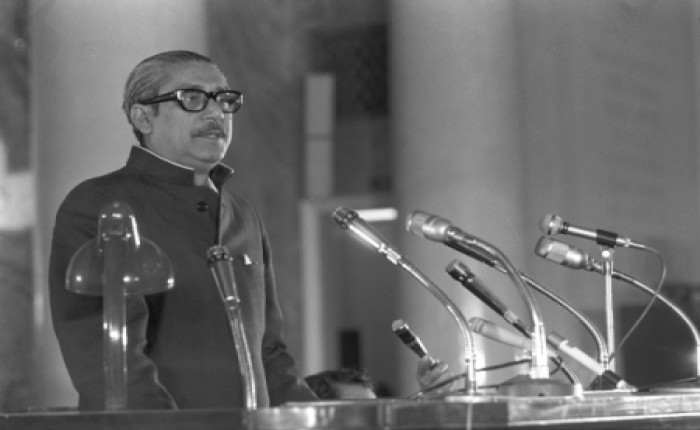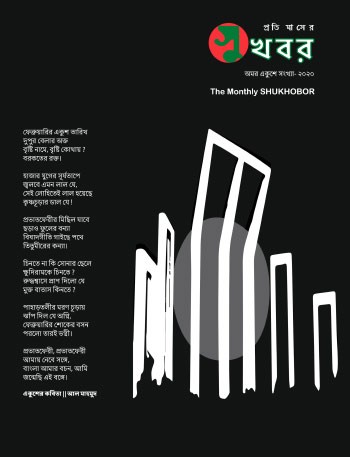- ● যেভাবে ‘টেসলা’য় কর্মরত বাংলাদেশের রাফা
- ● A Decade of Recitation Elegance: Bachonik Celebrates 10 Years of Artistic Brilliance
- ● বর্ণাঢ্য আয়োজনে বুয়েট নাইট অনুষ্ঠিত
- ● ‘গান্ধী শান্তি পুরস্কার’-এ ভূষিত বঙ্গবন্ধু
- ● শনিবারের কলমে হিমাদ্রী: মায়ের “শেখসাব”
- ● সুখী দেশের তালিকায় কানাডা ১৫তে, শীর্ষে ফিনল্যান্ড
- ● গিনেস বুকে ‘শস্যচিত্রে বঙ্গবন্ধু’
- ● দক্ষিণ এশিয়ার সেরা দশ তরুণ নেতাদের তালিকায় মাশরাফি
- ● ‘স্বাধীনতা পুরস্কার’ ২০২১ পাচ্ছেন যারা
- ● প্রসংশায় ভাসছে জিয়া হাসানের সাথে ঘরোয়া’র স্বত্বাধিকারীর আলাপচারিতা
‘We must now and forever roar for Bangabandhu’

As far as I can remember, I have always been Canadian. I was born in Norway and a little bit before my 1st birthday we moved to Canada. For all intents and purposes, you will most likely consider me Canadian. What does a Canadian-grown kid have to write about in an issue dedicated to Bangabandhu Sheikh Mujibur Rahman? The answer is a lot. Thanks to this great man, the preconceived notion that I am a “bideshi” kid is false. As much as I am proud to be Canadian, I am even prouder to be Bangladeshi.
I was lucky enough to grow up in a country like Canada. I grew up meeting people from many different countries, and as we grew up and experienced the world together, I got to learn about many different cultures. As I met friends from Afghanistan, from the Philippines, from Sri Lanka, and from India, I noticed the kids had a sense of national pride that many of the Bangladeshi children lacked. The Afghan kids would tell me about Ahmed Shah Massoud the “Lion of Panjshir”, whom fought against the Soviets and then against the Taliban. The Phillipino’s would hang their national pride on the shoulders of one of the greatest boxers of all time, Manny Pacquiao. My Tamil friends would boast about their Tamil Tiger leader, their brave leader Prabhakaran. I would wonder whom do we boast about? Who is the hero that brings us national pride?
Finally one day I had enough. Surely as a Bangladeshi, there must be someone I can be proud of. There must be someone who makes me proud to say “I am Bangladeshi.” Indeed there was, and indeed from there on, I would proudly announce my Bangladeshi bloodlines.
I came home from school one day, a student at Oakridge Junior Public School enrolled in grade 1 at the time, with a question on my mind all day. I went to my father and asked him, “Abbu, who is our country’s hero?” He pointed at a picture on the wall, “You see here, this is your mom’s Mama, and you see beside him?” I looked at this man, a well-trimmed mustache, bold sunglasses sitting beside who would be my great-uncle. “That is Bangabandhu Sheikh Mujibur Rahman, our Father of the Nation.” Woah! Father of the Nation? How is that possible? What did he do? How did he become this title? Throughout the course of the day, I was immersed in this story. It was almost too good to be true.
Our nation fought for independence, it came together with his leadership, fought a guerilla battle with the assistance of India, defeated Pakistan, and became a nation. Men and Women came to arms together and fought. What a story! As I grew older, I researched further into Sheikh Mujib’s story and the greater story of our independence, and my appreciation grew stronger.
If it wasn’t for the bravery of those Bangali men before me, I would not be here in Canada. Men like Abdus Salam, Rafiq Uddin Ahmed, Abul Barkat, Abdul Jabbar, Shafiur Rahman, Ahi Ullah, Abdul Awal, men who stood and facing down the barrel of guns held by Pakistani police forces. They fought for their language and their people. They fought so the language I speak at home, Bangla could be spoken, could not be wiped out. The language I was luckily given to speak was fought for, brave men shed their blood so I could speak it. My best tribute to them is to speak it as best as I can, and our best tribute is for every parent to try and teach their child Bangla to the best of their ability. We all learn English in school, we can all practice English amongst friends, but to pay respects to our national heroes, the parents should pass down this language to their children. The men I listed above and the many more like them, did not give their life so that us Bengali’s can come to Canada and in one or two generations, give up our language and just speak English.
From my research of our Language Movement came our next big step as a people, the rise of the greatest Bangali ever, Sheikh Mujibur Rahman. What a man he was. My favorite moment that encapsulates my pride in being Bengali and my love for Sheikh Mujib is his 7th March Speech at the Ramna Race Course. To this day that video gives me chills, the voice, the physical stature, the power he wielded with just his words, he was everything I was told Bengali’s cannot be. I remember watching his speech for the first time, sitting with my dad. Hearing him shout “Joy Bangla.” What a man he was. Ahmed Shah Massoud is called the Lion of Panjshir, Sheikh Mujib is our Tiger of Bengal.
Sheikh Mujibur Rahman, Muhammad Ataul Gani Osmani, and the many more freedom fighters fought to be Bangladeshi, so I could be Canadian. They fought so Bangladeshi children can now grow up in Canada, USA, Australia, Germany, Norway, and the list goes on.
If you ask me what does Sheikh Mujib means to me? This man gave so much to me and I have never met the man. He has given so much to the Bangladeshi diaspora throughout the world. At a time when Bangladeshi’s were treated as second-class citizens, he empowered us and showed us we are more than that. Our country since then went through a lot of turmoil, still, to this day there are growing pains and future challenges. What nation doesn’t have growing pains and yet I notice when Bengali kids speak of their country it’s in a dismissive tone. Bangladesh is backward and will be stuck like that. Afghans do not speak of their nation like that. Indians dismiss any negative characteristics of their country. Bangladeshis however, are quick to put down their country.
Our economy is booming, more and more women are entering university, they have higher literacy rates, and poverty is quickly falling. There is still much work to do, but much work has been accomplished. The story of Bangladesh is a story of resilience. From a nation of people, treated like second-class citizens in East Pakistan, rose first a student movement to fight for our language. The fight for our language led to the fight for a nation. Men like M.A.G Osmani, men like Sheikh Mujibur Rahman, empowered our Mukti Bahini and we fought. Blood was shed, men and women gave everything they had, for a language, for a culture, for a country. That country faced brutal dictatorships and brutal turmoil. That country rose from the turmoil to build one of the fastest-growing economies in Asia. That country is still improving daily with all the odds against it. Bangladesh as a nation is an underdog story and yes maybe we are still the underdog in between India and China. What is for sure however that is the Bengal tiger roared once in 1952, roared once in 1971, and is roaring again. But it could not roar in 2019 if it wasn’t empowered to roar in 1971.
Sheikh Mujib roared for us, he gave us a country; we must now and forever roar for ‘Bangabandhu’. If it wasn’t for him, I wouldn’t be in this country. If it wasn’t for him Doly Begum would not be the first Bengali MPP in Canada. If it wasn’t for him Bangla Town wouldn’t exist as we would not all be here.
That is the message that I hope lives on amongst my generation of Bengalis and beyond in Canada and other nations. Be proud of your country, be proud of your language, and be proud of your culture. It was worth fighting for, it was worth dying for, making it worth living for. That is what Sheikh Mujibur Rahaman and our struggle taught me, that is why I cherish him and everyone who fought for us. Pass the story on, pass the language on, and pass the culture on.







